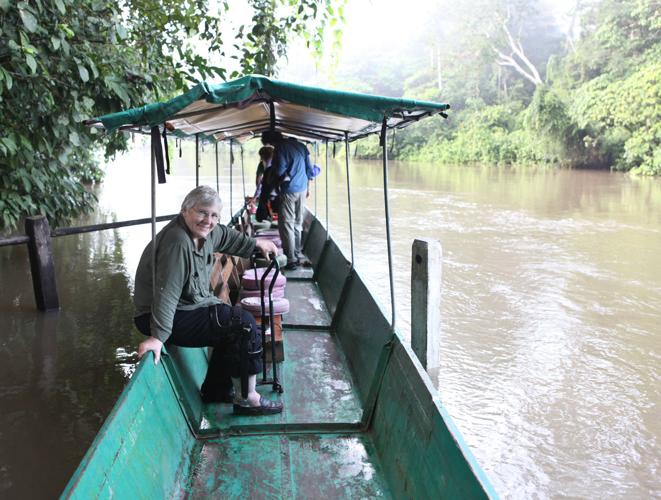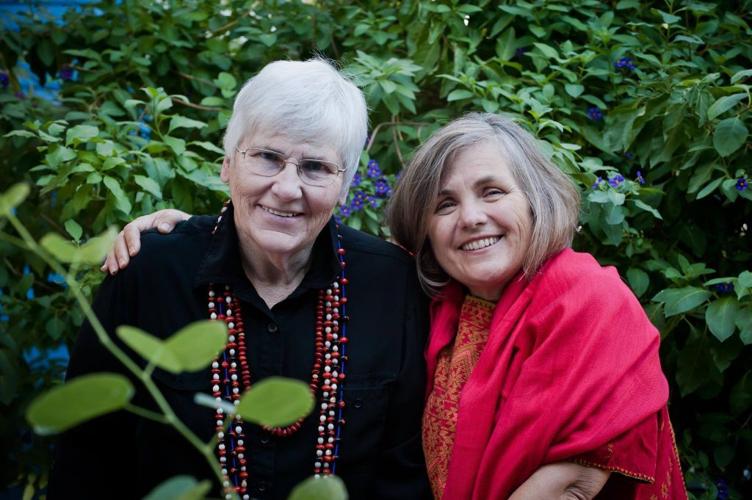Waking up in the Amazon is like waking up in the Garden of Eden, says Sister Judy Bisignano.
It’s practically paradise.
The Adrian Dominican sister half expected to catch Adam and Eve sauntering between the trees on one of her five trips to visit the Achuar people in Ecuador through the conservation organization The Pachamama Alliance.
She never spotted the Bible’s first couple, but for Bisignano, now 73, the visits were sacred. She knew it the minute she first arrived in the rain forest.
That is the story she tells in her new book “Sister Jaguar’s Journey” and the 20-minute documentary showing at The Loft Cinema on Friday, Dec. 11.
“I knew right away I was not in Des Moines, Iowa, or in Tucson, Arizona,” she says. “I was not fighting the Department of Education or the Catholic Church. It was such a shock. I knew I was on a trajectory to change.”
Bisignano cites an abusive power struggle with her mother and harsh treatment as a young nun as early scene-setters for a life of bitterness and anger.
In Tucson, she helped to start two alternative education schools — Kino Learning Center and César Chávez Learning Community, Inc. In separate ways, both failed to meet state standards.
Bisignano left Kino after a 1991 kidnapping on campus revealed that the school was not properly licensed for preschool and other programs, media reports show. And the César Chávez Learning Center closed in 2010 after its charter was revoked for failing to comply with criteria of the state and the federal No Child Left Behind Act.
Bisignano told the Star at the time of the closure that she blamed herself.
So to the rain forest she went, looking for peace.
And when it came, so did a new name for a new life: Sister Jaguar.
SISTER JUDY
Growing up in Des Moines, Iowa, Bisignano lived a few doors down from nuns. With them, she sought refuge from an abusive (though now reconciled) relationship with her mother.
Life as a nun was considered honorable in her Catholic family. She never considered another path.
“I expected an intellectual and prayerful atmosphere,” she says. “I didn’t expect boot camp.”
Bisignano persisted because she wanted to stand for social justice, and she knew that she had a better chance to do so as a nun.
As an educator in Tucson, at the Kino school for more than 20 years and at the César Chávez center for about 10, she wanted to inspire confidence and creativity in her students.
When the Arizona State Board for Charter Schools notified Bisignano of its intent to revoke César Chávez’s charter about a year prior to the school’s closure, Bisignano already knew it was coming. The students weren’t passing their AIMS, or Arizona’s Instrument to Measure Standards, tests, she says.
At that point, she was already working with communication philosopher Sandra Morse personally and at the school.
“I can see I have trouble communicating,” Bisignano says, describing early conversations with Morse.
“Have you thought of how you respond to the teachers? To the nuns?” Morse had asked her. “Do you see a pattern?”
Bisignano did. The problem was hers — her anger, her bitterness, her inability to communicate.
Morse had a possible solution.
The Amazon.
SISTER JAGUAR
Sitting in a canoe in the Amazon, Bisignano heard life change before she saw it.
“I’m just writing in my journal. I’m just praying. I’m just doing whatever nuns do,” she says. “I’m just listening.”
Squelch. Squelch. Squelch.
She thought she was hearing a machete hack through the rain forest. She was wrong.
On the other side of the river, a black jaguar waded through the water.
“It pounces on this big, white bird, and it turns around with the white bird in its mouth,” Bisignano says. With its prey captive, the jaguar stalked down the river.
Although she had already begun to experience greater peace on earlier trips to the Amazon, the jaguar sighting symbolized a sharper change. In Achuar culture, catching a glimpse of the elusive predator indicates coming change, often related to physical or spiritual death, Bisignano says. And those sightings are far from common, especially for visitors.
So the Achuar began calling her “Sister Jaguar.”
And indeed, death followed.
“When she saw the jaguar, life fell apart. She broke her leg. The school closed. It fell apart so she could recreate it,” says Morse, who led all of Bisignano’s trips through her involvement with the San Francisco-based Pachamama Alliance, an organization dedicated to preserving the Amazon and its people.
The nun’s life bottomed out.
“Here is the great Sister Judy,” Bisignano says wryly of her collapse. “It’s humbling. Piece by piece you restore life.”
Writing the book and returning to film the documentary with Tucson filmmaker Sande Zeig contributed to her healing process, though she knows the experiences she shares in the book may upset some.
“I find her story inspirational in that she is a nun who is in the later years of her life who was still looking for spirituality and hadn’t found her own real sense of it,” Zeig says.
In the rain forest, Bisignano learned about the Achuar belief equating deity to Mother Earth or “Pachamama.” To her, this made more sense than religious regulations.
“I see a big difference now between religion and spirituality,” Bisignano says. “I go to spirituality, not religion to find God. I was always trying to fit into the sacraments of the Catholic Church.”
Finding freedom from that structure in the rain forest has helped her find an ease and grace she never knew before. She also attributes her new perspective to a hallucinogenic tea used as medicine in shamanic rituals. In the U.S., the active ingredient in the brew is a Schedule 1 controlled substance.
Though old characteristics still persist, the harmony in the rain forest helped Bisignano to reconcile past hurts and failures.
“I feel one with the Achuar and part of the web,” Bisignano says. “I found a place in the community, but also in nature.”





